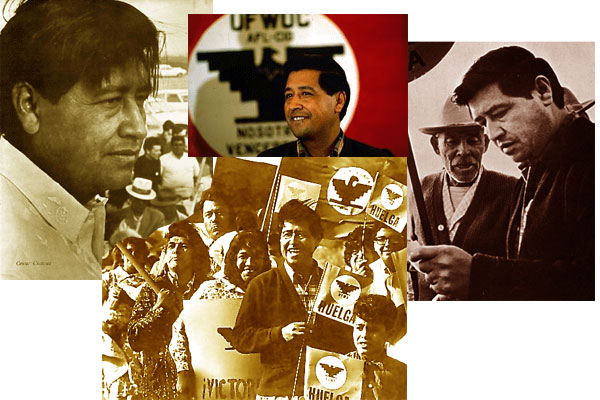
Fernando Chavez wrote of the time that his father explained to his family that President Johnson was offering to make Cesar Chavez the head of the Peace Corps in Latin America
No, the other Cesar Chavez
By Richard Gonzales
Special to the Star-Telegram
When asked what they know about Cesar Chavez, some Latino students respond that he was the famous Mexican boxing champion with the mean left hook.
They put up clinched fists and slice the air with jabs. They find pride in the Mexican fighters, who have entourages that carry the Mexican flag and are ready to rumble. For too many Latino youths, the broken nose, the cut eyes and the knockout are their source of pride, their badge of courage.
They expect their heroes to follow the violent tradition of other Mexican heroes: Guatemozin, Miguel Hidalgo, Emiliano Zapata, Pancho Villa. Mexican history is replete with revolutions, assassinations and slavery in the struggle for power among the classes. The combatants were men and women who fought for the poor against the corrupt, the rich, the invaders and the government, convinced that the enemy must die or surrender.
Despite the bloodshed, Mexico still wrestles to feed, clothe, shelter and educate its citizens. Like its smoldering volcanoes, the country rumbles with discontent and misery. Mexican workers' growing presence at America's farms, construction sites, factories, kitchens and hotels tells of the harsh realities of life in Mexico.
Latino youth are startled to hear that, unlike multimillionaire boxer Julio Cesar Chavez, union organizer Cesar Chavez never owned a house or earned more than $6,000 a year. He didn't wear elegant suits or drive luxury cars.
Cesar Chavez was a militant, nonviolent advocate for justice who marched into grape, cotton and vegetable fields with a United Farm Workers union flag. When he died in 1993, his wooden casket was buried in a simple grave surrounded by 40,000 mourners.
Chavez understood the economics of abusive power and the lure of violence. The more that power was concentrated in the few rich, the more likely it was that the disenchanted poor would resort to violence.
He knew the tendency of the poor and their allies to romanticize their cause and rationalize their hatred. But he had read the works and studied the nonviolent resistance of Mohandas Gandhi and St. Francis of Assisi. He learned hard-boiled organizing skills and resistance tactics from Fred Ross, an agent of the Industrial Areas Foundation.
When pressured by his followers to strike back at the growers -- for the beatings by their goons, for the use of attack dogs -- Chavez refused. He told them that it took more courage to follow the path of nonviolent boycotts and protests. Higher wages and safer working conditions were not worth the loss of one life.
For an uneducated people short on nonviolent heroes, Chavez's fasts, marches, arrests, boycotts, speeches and strikes were startling examples of the power of a spiritual man.
His morality-play struggle of field hands vs. farm owners drew powerful men like Attorney General Robert Kennedy, the Rev. Jesse Jackson and Gov. Jerry Brown to his side. He needed their support against the likes of California Govs. Ronald Reagan and George Deukmejian, who supported the farm owners.
His opposition saw a bold Mexican-American dare to challenge them to pay their Latino, Filipino and Arab field workers $5 an hour, provide toilets and water in the fields and contribute to their heath care fund. Chavez demanded that the growers stop spraying the fields with poisons that killed pests and field hands alike.
His oldest son, Fernando, wrote of the time that his father explained to his family that President Johnson was offering to make Chavez the head of the Peace Corps in Latin America.
The job paid more money than he had ever earned as head of the United Farm Workers union. It would provide for a house, maids, a life away from the fields. Chavez's wife and children would leave behind poverty, rocks thrown through their front windows and lectures from teachers about how the farm workers were led by Communists. They could live like kings.
But then Chavez explained to them how much the farm workers suffered and how much they needed him. The family voted 8-1 to see the struggle to the end.
Chavez looked like many of the other campesinos: dark as the earth that he stooped over, hair black and straight as the rows of vegetables, Native American features soft and good-looking as the fruits on trees.
At 11 a.m. Saturday, followers of Cesar Chavez's nonviolence and quest for justice will march in downtown Fort Worth chanting, "Viva Cesar Chavez!" in hopes that children remember his legacy.
Richard J. Gonzales is an Arlington resident and free-lance writer. Rgonz37034@aol.com
